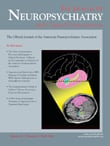SIR : Persistent long-term cognitive sequelae of neuroleptic malignant syndrome (NMS) appear to be rare.
1 Memory problems as sequelae of NMS have been anecdotally reported with NMS associated with typical antipsychotics, but to our knowledge, there are no reports associating it with NMS due to atypical antipsychotics.
2,
3 A case of persistent amnesia is described in a patient who developed NMS with olanzapine.
Case Report
“Mr. A,” a 16-year-old adolescent, with a history of schizophreniform disorder of 6 week’s duration, was initially treated with haloperidol (10 mg/day). However, this was discontinued within a week due to severe extrapyramidal symptoms (EPS). Mr. A did not receive any medication for the next 2 weeks and was then started on a regimen of olanzapine, 7.5 mg/day. A week later, he developed severe EPS again and olanzapine was stopped and the patient was treated with trihexyphenidyl (4 mg/day) and lorazepam (1 mg/day). Three days later, Mr. A developed a fever and worsening EPS. Over the next 3 days, this evolved into a full-blown NMS characterized by a fever of 102°F, marked rigidity, altered sensorium, urinary incontinence, labile blood pressure, tachycardia, and excessive sweating. Serum creatine phosphokinase (CPK) was 1,144 IU/liter (normal range, 0–200) and WBC count was 15 x10 9 (normal range, 4.5–11.0). Other blood work, including renal, hepatic, and electrolyte profiles were normal. He scored 5/30 on the Mini-Mental State Examination (MMSE). His computed tomography head scan did not reveal any acute changes. He was subsequently treated with norfloxacin for a urinary tract infection. Four days after Mr. A developed hyperpyrexia, he was treated with bromocriptine for the next 4 weeks. Ten days after starting treatment with bromocriptine, the patient no longer displayed any physical symptoms of NMS with the CPK and WBC count returning to normal. However, he continued to exhibit significant cognitive deficits and his MMSE score was only 14/30. He had intact attention, concentration, and calculation, but was only oriented to person and had impaired immediate and delayed recall. His mental status was remarkable for confabulation, perseveration, and echolalia. No fluctuation in consciousness or perceptual abnormalities suggestive of delirium were noted. His remote memory was relatively intact. On discharge, Mr. A continued to show improvement in his cognitive functions, and 2 months after the onset of NMS, his score on MMSE was 25/30 with persistent deficits in immediate and recent memory. He still had retrograde amnesia about the events surrounding the NMS and also had anterograde amnesia with deficits in learning new verbal information. Again, no deficits were noted in remote memory.
Comment
This patient met DSM-IV criteria for NMS. The cognitive deficits seen in this patient following NMS are reminiscent of an organic amnestic disorder, a rare entity described in patients recovering from NMS.
2,
3 Of interest, among all the cognitive domains, memory impairment is the only one that has been consistently reported on recovery from NMS. Whether the concurrent urinary tract infection and the resultant delirium could have contributed to this presentation cannot be entirely ruled out. However, this seems less likely as this patient continued to exhibit cognitive deficits long after recovery from the urinary tract infection. Moreover, the Physicians’ Desk Reference does not suggest any association of norfloxacin with cognitive deficits. Some investigators have speculated that these persistent deficits may be a consequence of complications of NMS, such as prolonged hypoxia and extreme hyperthermia.
1 This is supported by reports of memory deficit as a neuropsychological sequela of heat stroke.
4 In conclusion, more research is encouraged to explore why memory is preferentially involved in NMS. Excitotoxicity due to glutamate surge has been implicated in ECT-induced memory dysfunction,
5 and glutamate has also been hypothesized to play a role in NMS.
6 Thus, it would be interesting to decipher the role of this neurotransmitter in long-term cognitive sequelae of NMS.

